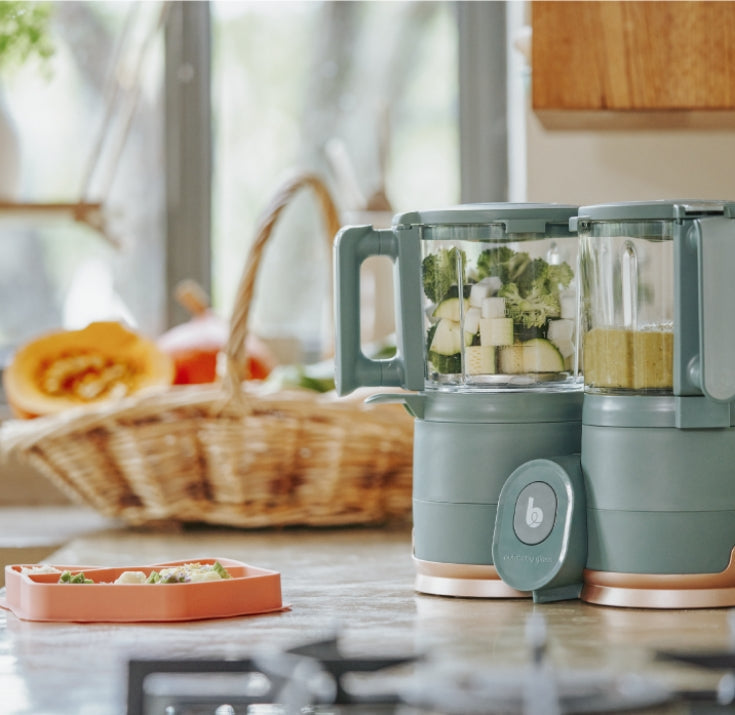Load up on these prenatal power foods to support mum's health and baby's development...
When pregnant it's vital to make sure you and baby get the nutrient-rich food for development and growth. Below we have listed some wonderful power foods that will fill you with all the goodness you need whilst growing a new tiny person.
Our Nutribaby+ is the perfect tool to use to whip up fast and nutritious meals all the way through to weaning and beyond. Whether it's cooling fruit-packed smoothies, warming breakfasts or steaming veggies and poultry it is a 5-in-1 meal prep station that can Steam, Heat, Defrost, Blend and even sterilises.
Eggs
Eggs are packed full of protein, which is a crucial nutrient in your pregnancy diet since it promotes your baby’s growth as well as the growth of your organs and breasts. Some pregnant women find meat unappetising, so eggs can be a positive replacement. Check out the NHS guidelines on eating eggs while pregnant here: https://bit.ly/2Ms2qnb . Why not try an omelette for dinner, or having scrambled egg on wholemeal toast for breakfast?
Beans
Beans are another good source of protein – and are a fantastic option for vegetarians. They also contain iron, folic acid, potassium and fatty acids, which are all important during pregnancy. Beans are a high-fibre food, to aid digestion and combat constipation.
Whole Grains & Starchy Carbs
Foods that provide long-lasting energy will be your friends during pregnancy – and starchy foods like oats, rice, pasta, potatoes, maize and wholegrain bread will keep you feeling fuller for longer. These high-fibre foods provide essential vitamins for you and baby, including antioxidants and Vitamin E. You could consider fortified breakfast cereals, which boost your intake of Vitamin D and iron too.
Sweet Potato
Tasty and healthy, sweet potatoes are high in Vitamins A and C as well as folic acid and fibre. The starch will help you feel full of energy, fighting off pregnancy fatigue – and they even count towards your 5-a-day. Try swapping this for your regular white potato mash, or make some quick sweet potato fries as a snack.
Salmon
The NHS recommends pregnant women should eat at least one portion of oily fish a week (but no more than two). Oily fish like salmon, sardines and mackerel are rich in omega-3 fatty acids, which promote healthy brain development for baby, as well as lots of Vitamin D to strengthen their growing bones. Salmon, in particular, is packed with vital nutrients to help your baby grow, and is an incredibly versatile fish. For more information about eating fish safely during pregnancy, go to: https://bit.ly/2OlEjsn .
Edamame
Edamame or Edamame beans are an excellent source of protein and fibre. Like all soy foods, these little beans fresh out the pod are a source of B vitamins including folate which is crucial during pregnancy, particularly in the early stages. The good news is a cup of edamame provides a full day's worth of folate, and are also packed with zinc, copper, magnesium, and iron. medicinenet.com
Greek Yoghurt
With much higher protein levels than regular yoghurt, Greek Yoghurt is a wonderful source of calcium which will help baby develop a strong skeleton. It contains probiotics to maintain your digestive health and is rich in Vitamin D and folic acid. The beauty of Greek Yoghurt is that it tastes great at any time: it makes a delicious breakfast with granola, it can be added to savoury meals and it even makes a refreshing dessert.
Avocado
Avocado is rich in monounsaturated fats which are healthy fats and perfect for developing brains. One avocado provides nearly a third of the required daily intake of folate, and because it is in the natural form, it is highly bioavailable (its ability to be absorbed and used by the body). Avocados are also high in carnitine and potassium. Try using avocado instead of butter on toast or sandwiches. Add it to a smoothie for a rich creamy flavor without the dairy. medicinenet.com
Lean Meat
During pregnancy you need to increase your intake of iron – meats like beef, pork, lamb, chicken, and turkey offer a tasty solution. Opt for lean, low-fat cuts where possible and always ensure they’re well-cooked all the way through. Avoid over-processed meats, and try not to add fat during cooking.
Dark Leafy Greens
These are pre-natal superfoods! Greens like spinach, kale and Swiss chard are packed with Vitamins A, C and K. While they might not be your favourite tasting veggies, they’re really easy to incorporate into your daily diet – you can blend them into smoothies and soups, or dice them up and pop them into omelettes or stir-fries.
Hummus (Best for pregnant mothers with Diabetes)
Hummus is high in protein and low in fat. Hummus has a very low glycemic load; and adding it to higher glycemic load foods, like bread or crackers, will add lower the impact of the total meal on your blood sugar. This makes it a useful food for managing and minimizing the effects of gestational diabetes. medicinenet.com
Colourful Fruit and Veg
They don’t just look pretty: those colours are loaded with precious vitamins and minerals to provide baby with a variety of nutrients. Salads can be an easy way of including reds, oranges, yellows, greens and purples onto one plate. Broccoli, in particular, is full of calcium, antioxidants and Vitamin C. Oranges are another top pick: high in Vitamin C, folate and fibre, plus they’re 90% water to help keep you hydrated and feeling fresh. Peas are an excellent source of plant-based protein and a good source of calcium, magnesium and folate. Any plant-based proteins are a winner as they can substitute for pro-inflammatory animal proteins.
Figs
There is a huge 5 grams of fibre in just 1 cup of dried figs. Figs are also a great non-dairy source of calcium; one serving contains about a quarter of your daily needs. And while your teeth may not appreciate the high sugar content, in moderation they will benefit from the potassium, phosphorus and magnesium in figs. Figs are also a great source of essential iron to protect against anaemia and Vitamin K for proper bone formation. TIP If you don't like the seedy texture of dried figs, try fresh ones. Or, purée them, then use the purée as a sweetener or fat substitute in recipes. You can make fig purée by combining 8 ounces of dried figs with 1/4 to 1/3 cup of water in a blender. fitpregnancy.com
Bananas
A power food in all phases of life, bananas are a source of quick, long-lasting energy to keep you going. The potassium-rich fruit is also great for morning sickness, as it’s light and easy on the stomach. Slice up and put on top cereal, blend into a smoothie or just eat as it is – the peel’s natural packaging makes them the perfect on-the-go snack.
Nuts
High in proteins and fats, which are both crucial for your baby’s development, nuts are a healthy pregnancy snack to help you feel full (but remember to keep an eye on calorie content – nuts can be high, so eat in moderation). Walnuts are rich in plant-based omega-3, while hazelnuts are high in fibre, protein and Vitamin E which supports the development of the immune system.






Leave a comment
This site is protected by hCaptcha and the hCaptcha Privacy Policy and Terms of Service apply.